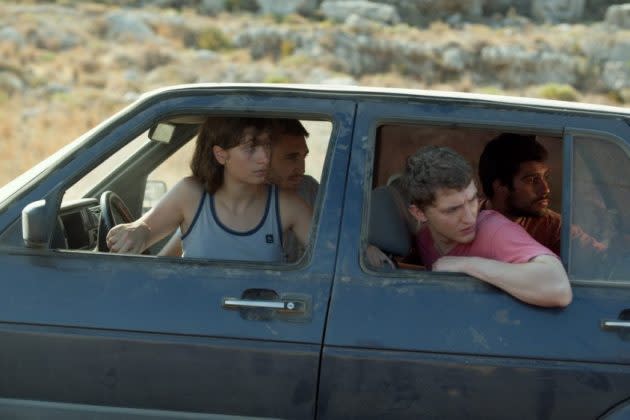‘Music’ Review: Angela Schanelec’s Radically Mystifying But Rewarding Riff on ‘Oedipus Rex’

Writing about music is like dancing about architecture, the maxim goes. And writing about “Music,” the latest beautiful and strange deep-niche arthouse artifact from uncompromising formalist Angela Schanelec, feels like a similarly doomed proposition. The limitations of language are seldom as apparent as when grappling with the silvery elisions and crisp, cryptic omissions of this glancing take on Sophocles’ “Oedipus Rex.” Schanelec is unlikely to vastly expand her fanbase here, but the tiny, fervent following she has accrued over the course of now 10 fantastically intricate features may be more than ever entranced by the fertile illogic of “Music,” a postmodern expression of a premodern text.
Quite what a viewer who doesn’t go in knowing that Schanelec is interpreting Sophocles would make of this film is impossible to imagine. And it’s not like the writer-director-editor is going to make her inspiration explicit. Indeed, the Greek myth most recalled by the opening is not that of Oedipus but Sisyphus. In a vast wide, in the failing light, we discern the figure of a man in distress, staggering through a littered ravine carrying a woman’s body. A little later, he is scrabbling for a foothold on the hillside.
More from Variety
Suddenly we are elsewhere (Schanelec’s editing style is characterized by ambitious excision), where EMT Elias (Argyris Xafis) retrieves an abandoned baby from a roadside shack. He brings the baby home to his wife (Marisha Triantafyllidou) to raise together — an act subconsciously communicated in a tableau that showcases how DP Ivan Markovic’s beautiful, grave cinematography can be matched in evocative power by Rainer Gerlach and Dimitris Apostolou’s eerily precise sound design. It is a long, steady shot of an empty bedroom with a barely stirring lace curtain, which cuts only after we hear the slightest baby-gurgle coming from offscreen.
At the beach, the new mother washes the baby’s feet in the sea like she’s performing a baptism. And so when we vault forwards again, and a young man is introduced as a pair of bloodied, bruised feet exiting a car, we inherently understand that this is the baby, all grown up. He is Jon (Aliocha Schneider), and this seaside trip with some friends will end in the accidental manslaughter of a stranger (Theodore Vrachas), for which Jon will go to prison. There he will meet and fall in love with prison guard Iro (Agathe Bonitzer), with whom he will eventually have a daughter, unaware of a link between Iro and his past crime that will eventually lead to more tragedy.
On the most superficial level, that is what happens, but plot hardly conveys the film’s effect, so we roll back down to the bottom of the hill of attempting to describe “Music” again. If there is one key to mapping Schanelec’s film onto its textual forbear, it’s to realize that here, time passes, babies grow into children, but the principals do not age. A man can appear to be roughly the same age as his adult son. Bar the acquisition of glasses to offset his failing eyesight, Jon looks the same even many years later, when, in Schanelec’s most radical departure from Sophocles’ text, unlike his ancient counterpart, he is allowed a new life after catastrophe. Part of the pleasure of this daring and perplexing conceit is purely aesthetic, with Schneider and Bonitzer’s sculpted, handsome faces looking eternal, like those of classical statues come briefly to life, but with the potential to turn back into marble at any moment.
Of course the film lives much more in the mind than the heart. But inside its sharp edges there is a vivid tenderness too. The performance style is removed to the point of dissociation, yet full of peculiar light and grace. Simple gestures like smoking a cigarette or handing money across a pharmacist’s counter are done with soft, dextrous hands. Jon helps Elias up after he stumbles in grief. Animals and human onlookers provide mute, sympathetic witness from the edges of so many frames. And there are the songs: There is precious little music in “Music,” but when it comes, in the form of classical madrigals and Doug Tielli’s otherworldly original compositions that Jon sings in a voice pure and rising, it briefly makes the film into a church.
This is a movie that demands something of the viewer, in a time when to make such demands is unfashionable and has even come to be regarded with suspicion, as though to do anything with your film other than entertain is unpardonably pretentious. But for the few, the brave, the intellectually reckless who are immune to accusations of overthinking things, “Music” is entertaining, giving a sudden, difficult workout to a part of your brain that may have become a little atrophied — at least since the last Angela Schanelec film.
Whatever its frustrations, they are outweighed by the pleasures on offer in this scintillating example of film’s uncanny ability to transcend itself, to operate on planes above, below and in between the images and soundscapes of which it is composed. That statement will, like “Music,” appear insufferably pseudo-artsy to many. Yet it will still be inadequately grandiloquent to the (very) few of us who will have to resist the urge to fall in awe at the feet — bloodied or bathed — of work like this, that insists on cinema as a mystery to be marvelled at, rather than a riddle to be solved.
Best of Variety
Sign up for Variety’s Newsletter. For the latest news, follow us on Facebook, Twitter, and Instagram.
